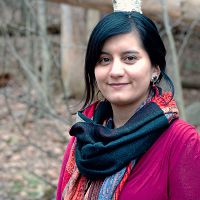Luquillo CZO SAVI International Scholars Program recipients anounced
10 Apr 2018
Two Luquillo CZO researchers have been named SAVI International Scholars Program recipients,
Emma Harrison from the University of California San Diego Scripps Institution of Oceanography:
Soil covers 94% of Earth’s ice-free surface and is the central component of the Critical Zone. Historically, this dynamic layer has been ignored when attempting to understand how the Earth responds to tectonic perturbations. Today, we do not understand how soil - a critical natural resource - responds to state change and environmental or tectonic perturbations. The Luquillo Critical Zone Observatory (LCZO) is a well constrained setting to study the impact of tectonic forcing on the soils of the critical zone. Here, the Rio Blanco watershed presents an opportunity for a natural experiment to address the first-order question about the impact of landscape evolution on soil production: What are the relative timescales of knickpoint propagation and soil development following uplift, fluvial incision and erosion? As a SAVI fellowship recipient, Emma Harrison will work at the University of Wollongong with Dr. Anthony Dosseto, measuring Uranium-series nuclide disequilibrium in soil profiles in order to constrain the timing of soil production and soil profile development on hillslopes throughout this evolving landscape.
María Chapela Lara from the University of New Hampshire:
With support from the SAVI International Scholars Program, I plan to conduct δ26Mg and δ26Li analysis at the German Research Centre for Geosciences (GFZ) over stream and related samples from the Luquillo Critical Zone Observatory (LCZO). This work stems from an ongoing collaboration between LCZO and GFZ-Potsdam investigators, whereby we previously found a decoupling between the sources of Mg that determine the composition of the stream and those cycled by the vegetation. I am now investigating if this decoupling is a general property that emerges at the late stages of Critical Zone evolution. As a piece of that general investigation, I will assess the role of lithology on the relative importance of surface/biological vs. deep critical zone processes over the Mg isotope composition of LCZO streams.
News Category:
RESEARCH |
EDUCATION/OUTREACH
Explore Further

